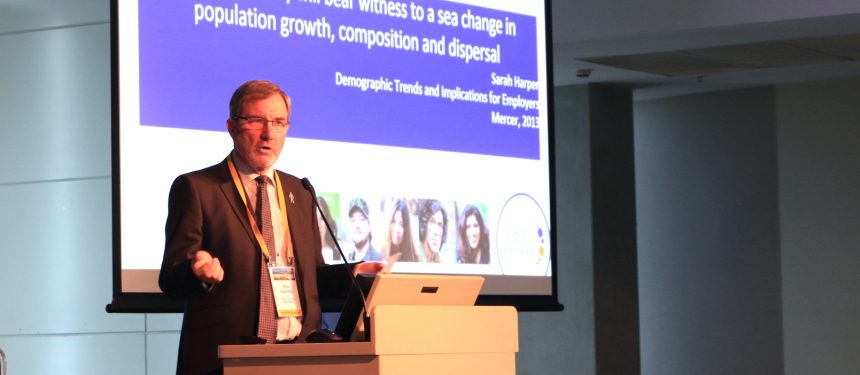Exuberant growth in international student numbers in recent years means New Zealand’s international education sector is thriving, but the country may have already experienced its high water mark, according to a leading academic.
News and business analysis for Professionals in International Education
Have some pie!
2016 could be NZ int’l ed high point, warns academic
 Paul Spoonley, PVC of college humanities and social sciences at Massey University, had strep warnings for delegates at the ISANA conference in New Zealand. Photo: The PIE News.
Paul Spoonley, PVC of college humanities and social sciences at Massey University, had strep warnings for delegates at the ISANA conference in New Zealand. Photo: The PIE News. The enrolments and economic growth experienced in New Zealand over the last few years could be the high point for the country’s international education industry, warned an academic during the ISANA conference in Wellington, New Zealand.
“I’m not sure the Chinese government is going to allow their skilled people to migrate to New Zealand”
Distinguished professor, Paul Spoonley, pro vice-chancellor of college humanities and social sciences at Massey University, used his address at the conference to identify a variety of concurrent global and domestic concerns for the industry, including declining birth rates in source countries, increased competition for international students, and government initiatives within source countries to retain talent as the main likely causes of negative growth.
“The willingness of countries like China and India to let their citizens live, work and study [overseas] will come to an end,” he told delegates.
New Zealand has recently seen significant growth in student enrolments, with the latest economic impact report valuing the industry at NZ$4.28bn in 2015/16, a 50% increase from 2014.
In particular, Spoonley pointed to increased pressure on the Chinese workforce from reduced birth rates, which he said were in part due to the one-child policy as well as an increased number of women choosing to remain within the workforce and urbanisation, as a barrier to more students going overseas.
Workforce pressures would mean a greater need for China to retain its talent in the future, he said, adding that it is also becoming a competitor for traditional destination countries.
“I’m not sure the Chinese government is going to allow their skilled people to migrate to New Zealand,” he said.
“Australia, Canada and New Zealand will not have the space to do what we are doing. There is going to be competition… and I think there are going to be barriers.”
“There is going to be competition… and I think there are going to be barriers”
In the proceeding panel discussion, featuring industry representatives from both New Zealand and Australia, IEAA CEO Phil Honeywood echoed these concerns.
“We often overlook China is now competing with us as an education destination,” he said, arguing that as China increases its wealth, its ability to provide scholarships has also increased.
“China is already picking the best and brightest from countries that Australia and New Zealand overlook, such as in Africa,” he added.
Spoonley also said domestic factors, such as student wellbeing and employment both during and after study, needed to be addressed.
Emily Fabling, international director at New Zealand’s Ministry of Education, agreed with the comments, adding a recent APEC Summit had highlighted how countries in the Asia Pacific region are viewing education.
“What are we educating for, if we don’t know what jobs will be in the future?” she asked the audience.
“The new shift for APEC countries is around soft skills. Not employment, but employability.”
Still looking? Find by category:


